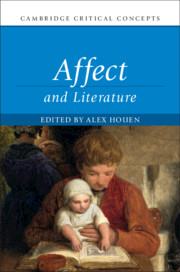Book contents
- Affect and Literature
- Cambridge Critical Concepts
- Affect and Literature
- Copyright page
- Contents
- Notes on Contributors
- Introduction
- I Origins
- II Developments
- III Applications
- Chapter 18 Affect and Environment in Contemporary Ecopoetics
- Chapter 19 Contemporary Crisis Fictions: Twenty-First Century Disaffection
- Chapter 20 Shiny Happy Imperialism
- Chapter 21 The Digital’s Amodal Affect
- Chapter 22 Digital Special Affects: On Exhilaration and the Stun in CGI Blockbuster Films
- Chapter 23 Cartesian Affect
- Index
Chapter 19 - Contemporary Crisis Fictions: Twenty-First Century Disaffection
from III - Applications
Published online by Cambridge University Press: 16 January 2020
- Affect and Literature
- Cambridge Critical Concepts
- Affect and Literature
- Copyright page
- Contents
- Notes on Contributors
- Introduction
- I Origins
- II Developments
- III Applications
- Chapter 18 Affect and Environment in Contemporary Ecopoetics
- Chapter 19 Contemporary Crisis Fictions: Twenty-First Century Disaffection
- Chapter 20 Shiny Happy Imperialism
- Chapter 21 The Digital’s Amodal Affect
- Chapter 22 Digital Special Affects: On Exhilaration and the Stun in CGI Blockbuster Films
- Chapter 23 Cartesian Affect
- Index
Summary
In this chapter, I explore the representation of affect in Tom McCarthy’s Remainder (2005) and Ben Lerner’s Leaving the Atocha Station (2011). These texts, on first sight, seem to reflect a notably affectless narration, yet here I argue that this absence of affect is itself felt to be a crisis, one which the character or narrator struggles to recognise or articulate. In these comparable invocations of emotional removal, disregard and isolation, set in a contemporary context of high speed connection, these writers thus facilitate a new articulation of crisis within the global neoliberal order, making visible a return to elapsed and displaced actualities. They contribute, in this way, to what has been called a ‘new sincerity’ within twenty-first century writing, though their understandings of this project often highlight an ironic affective separation from immediate surroundings.
Keywords
- Type
- Chapter
- Information
- Affect and Literature , pp. 355 - 372Publisher: Cambridge University PressPrint publication year: 2020
- 1
- Cited by

